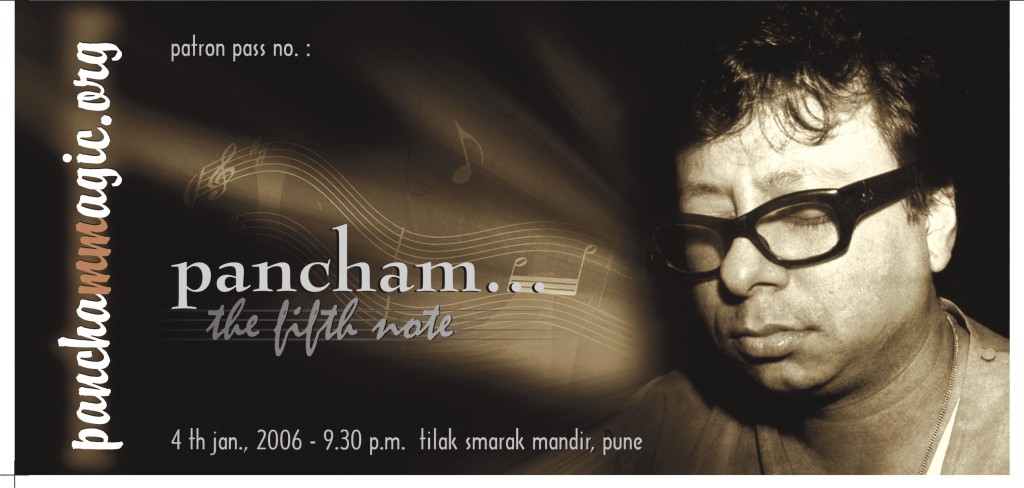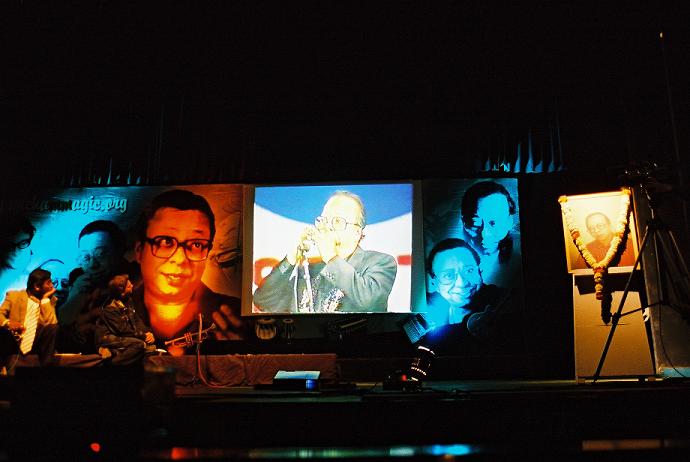4th Jan 2006 – Pancham…The Fifth Note
Guests:
Lalit Pandit – Music Director (Jatin-Lalit)
Kishore Desai – Mandolin
Jan 4 2006 was yet another great evening befitting the 12th episode on the 12th death anniversary of Panchamda.
As usual the show was packed in anticipation. The evening began with the signature opening piece from Hum Kisise Kum Naheen followed by a homage to the great man with ‘Tumhi Kato Je Dure’.
Ankush then opened the evening introducing the theme of musical phrases using vocals. The use of humming or wordless singing is probably as old as film music but as with everything Panchamda has his own unique examples of using it to great effect.
The first example shared was the happy version of the song ‘Hum Bewafa’ from Shalimar. Everyone knows the better known serious version with the words. The happy version was just a bit faster and the entire version is sung without words. Then followed the Satte Pe Satta example of ‘Mausam Mastana’ first in Panchamd’s voice during the sitting and then final version where some of the la la la from the sitting was retained in the final song. The Title song from YKB was next ” the family version ” which begins with the mukhda first sung as la la la to create the happy mood.
Then there were some examples of using such wordless phrases to distinguish two versions of the same song for example ‘Wadiyan Mera Daman’ in Abhilasha where the Lata version begins with an additional phrase not in Rafi version. Later we also heard a similar example from Manzil with the lovely phrase by Lata in between repetitions of the antara especially in the second antara. In ‘Mere Naina Sawan Bhadon’ too Lata does an opening phrase to establish the raga which is not there in Kishore version. His version begins with a different humming. Then followed examples of two singers in the same song having different phrases for their entry ‘ Kiski Sadayen’ from Red Rose. Still another usage was same singer for two actresses on screen was in Khushboo where the second actress voice only sings this wordless phrase to bridge the antara and mukhda in ‘Bechara Dil Kya Kare.’
Yet another usage of phrases was almost like brackets around the mukhda line. Two examples shared by Ankush were ‘Dil Haye Mera Dil ‘ from Paraya Dhan and ‘Socha Tha Maine’ from Chandi Sona. Or used to fade out a song as in ‘Chala Jata Hoon’ from Mere Jeevan Saathi.
Then there were examples of opening phrases to create the mood of the song much like classical singers do with an alaap. There was the echo-filled start to ‘Karvaten Badalte Rahe’ from Aap Ki Kasam to create the mood of being among mountains, the arabic phrases to set up ‘Matwali Aankhon Wale’ from Chhote Nawab. Or as in case of ‘Aane Wala Pal’ from Golmaal, to introduce Amol Palekar’s voice to Bindiya Goswami who is in love with the voice probably more than the singer. In this case its usage is less to create the mood but more to get the heroine to begin swooning before the actual song begins.
In ‘Koi Ladki’ from Seeta Aur Geeta the phrases follow the scale change and establish the newer higher scale, in Zamane Ko Dikhana Hai title qawwali it reminds of another song from the same movie seamlessly, and in ‘Bachna Ae Hasino’ from Hum Kisise Kum Naheen and ‘Sagar Jaisi Aankhonwali’ the phrases are longer pieces that take the song from present situation into a dream sequence. And in ‘Jane Do Na’ from Saagar there is just a brief hum as first interlude or M1. According to Bablooda who had appeared previously on the show, Pancham used to do this because he did not want anything to detract from the anatara that was to follow.
I missed some examples that I consider truly unique. For example the long prelude to ‘Bhai Batur’ in Padosan has a very western feel to it all through except right at the end where it segues into a very Indian ending. Another is the use of just one note in female voice that goes in the song ‘Aao Mere Paas Aur Aao’ before Kishore comes back to the mukhda. Still another is the use of Han by Lata in ‘Paas Rehta Hai’ from Ameer Admi Gareeb Admi without which the song just would not work. But then I guess one could go on and on.
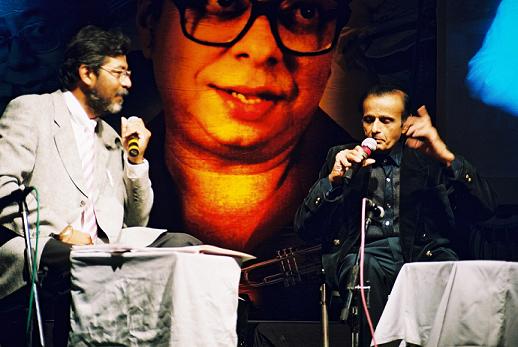 The second part of the show then started with Ankush introducing the 70 year old Mr. Kishore Desai the mandolin player whose best known piece for RD is the opening of ‘Tum Bin Jaoon Kahan’ and who has been playing in the industry for last 52 years! He narrated many funny episodes. Beginning with claiming to be Langot friend T of Kalyanji bhai because the two used to go swimming together and because of the costume they were literally langot yaar! Another incident was when Pyarelal bought a new car they all went for a drive and on Marine Drive encouraged by a challenge from someone Panchamda removed his trousers right there in the car. Kishore bhai also talked about the close relationship between these friends. He particularly talked about the extremely talented late Ganesh (younger brother of Pyarelal). With extreme candor he mentioned that he would not reveal secrets about some of Ganesh compositions since those tunes are now famous under other names. Responding to a question on remixes, he predictably denounced the practice saying its not right that these people eating fruits of someone else s lifelong labor. He also talked about how there were many Kishores in the industry but Kishore Kumar would call all others by their last name while he always called Kishore Desai by his first name.
The second part of the show then started with Ankush introducing the 70 year old Mr. Kishore Desai the mandolin player whose best known piece for RD is the opening of ‘Tum Bin Jaoon Kahan’ and who has been playing in the industry for last 52 years! He narrated many funny episodes. Beginning with claiming to be Langot friend T of Kalyanji bhai because the two used to go swimming together and because of the costume they were literally langot yaar! Another incident was when Pyarelal bought a new car they all went for a drive and on Marine Drive encouraged by a challenge from someone Panchamda removed his trousers right there in the car. Kishore bhai also talked about the close relationship between these friends. He particularly talked about the extremely talented late Ganesh (younger brother of Pyarelal). With extreme candor he mentioned that he would not reveal secrets about some of Ganesh compositions since those tunes are now famous under other names. Responding to a question on remixes, he predictably denounced the practice saying its not right that these people eating fruits of someone else s lifelong labor. He also talked about how there were many Kishores in the industry but Kishore Kumar would call all others by their last name while he always called Kishore Desai by his first name.
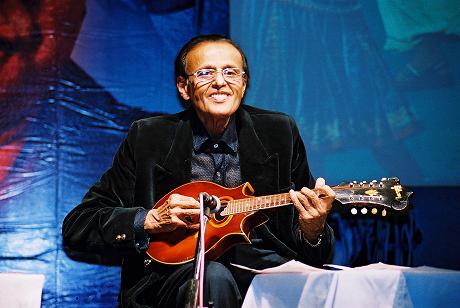 But the real excitement was to come when he picked up the mandolin and played some of his songs. He briely fingered the piece from ‘Khatouba’ which had been played earlier as the setup was being done. Then he began playing. First came ‘Gori Ho Kali Ho’ from Biwi O Biwi. The icing on the cake here was the piece on mandolin just before Kishore comes back to the mukhda. It was amazing watching Kishore Bhai fingers flying on the fretboard even at this age. Then came the immensely popular ‘Meri Pyari Bindu’ from Padosan. That drew immediate applause from the audience and went for an encore. The finish was the much awaited ‘Tum Bin Jaoon Kahan’. Given his age, it is understandable that he missed some notes and occasionally even the beat but those few lapses at his age paled in comparison with the sweetness of his rendering and his very likeable and engaging personality. In fact Kishore bhai talked about being referred as Lucky Kishore. All MDs wanted to have him because he was considered lucky. They would have play something anything to include him.
But the real excitement was to come when he picked up the mandolin and played some of his songs. He briely fingered the piece from ‘Khatouba’ which had been played earlier as the setup was being done. Then he began playing. First came ‘Gori Ho Kali Ho’ from Biwi O Biwi. The icing on the cake here was the piece on mandolin just before Kishore comes back to the mukhda. It was amazing watching Kishore Bhai fingers flying on the fretboard even at this age. Then came the immensely popular ‘Meri Pyari Bindu’ from Padosan. That drew immediate applause from the audience and went for an encore. The finish was the much awaited ‘Tum Bin Jaoon Kahan’. Given his age, it is understandable that he missed some notes and occasionally even the beat but those few lapses at his age paled in comparison with the sweetness of his rendering and his very likeable and engaging personality. In fact Kishore bhai talked about being referred as Lucky Kishore. All MDs wanted to have him because he was considered lucky. They would have play something anything to include him.
As Kishore bhai songs went into encore after encore one could see Ankush’s discomfort at the time getting prolonged. But after the Tum Bin encore the program had a brief interval. Post interval we were introduced to none other than Lalitji of Jatin Lalit. Lalitji gave a lot of insights into the industry and music in general but I was disappointed he did not specifically comment on the songs played.
Responding to question on RD introducing many instruments like bass guitar, Lalitji reminded the audience to also applaud the player Channi Singh who not only got the instrument but also learnt to play it with such skill. He said such players do not exist anymore. What made RD music great was not just the great composition but the outstanding team that would bring those compositions alive. And on top of that singers like Kishore, Rafi, Lata, Asha. Today singers are not even half of the golden singers and he said they would be the first to admit it too.
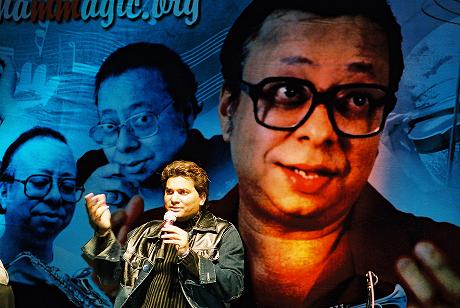 Lalitji talked about the differences in recording styles, how in the past the whole orchestra and singers would record the entire song all together. That made everyone tense and on the edge because one person mistake would cause repeat for everyone. Singers would be in one cabin by themselves and could not be heard by musicians. So conductor was everything. His signal would be critical to hold everything together. Today each person comes and does his part and goes. They don’t even get know the whole song let alone play all together.
Lalitji talked about the differences in recording styles, how in the past the whole orchestra and singers would record the entire song all together. That made everyone tense and on the edge because one person mistake would cause repeat for everyone. Singers would be in one cabin by themselves and could not be heard by musicians. So conductor was everything. His signal would be critical to hold everything together. Today each person comes and does his part and goes. They don’t even get know the whole song let alone play all together.
Lalitji said he was fortunate to have seen that era of recording all together because of the atmosphere it would create. He narrated an incident during recording of ‘Sa Re Ke Sa Re’ from Parichay where the kids were not getting it right. And that too at the end. So the whole song had to be repeated again and again. Finally one take happened where everything came out perfect except on kid started early towards the end. There was much debate on what to do when Kishore da finally said lets keep the take and get the kid on screen to also do the same. After they are kids and bound make mistakes now and then. And that is still there in the final recording.
Another recording glitch used to occur because of the equipment. He talked about the equipment in Film Center where the sprockets were misaligned and would cause a drag on some tracks. They experienced this in ‘Pehla nasha’ where the guitar tracks slightly lag others. They had taken Panchamda help on how to resolve this although some lag remains in the final recording.
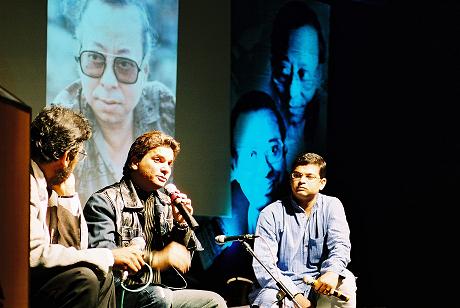 Lalitji also talked about how Pancham used to treat everyone as a close friend. And he used to extract music from musicians as a friend. That is why they would put their heart and soul into it. A music directors job is not just to use what is in his mind but to tap the ideas of his musicians and RD used to excel in this. Because of all these factors there is so much soul in the old songs that everyone finds missing. In that vein Lalitji said that given all these limitations of quality musicians, singers and the detached manner of recording, if today any song still touches us even a little bit we ought to salute the music director. He invited all of us to look out for the upcoming film ‘Fannah’ soundtrack which he was proud of. He mentioned about how they got into Yashji camp due to introduction by Asha Bhosle in 1994. At that time Aditya Chopra also sat in on their sitting. While Yashji was non-committal, Aditya liked some of their songs and invited them to do the music for Dilwale Dulhaniya Le Jayenge. That was the movie that really brought them into big league despite many hits earlier.
Lalitji also talked about how Pancham used to treat everyone as a close friend. And he used to extract music from musicians as a friend. That is why they would put their heart and soul into it. A music directors job is not just to use what is in his mind but to tap the ideas of his musicians and RD used to excel in this. Because of all these factors there is so much soul in the old songs that everyone finds missing. In that vein Lalitji said that given all these limitations of quality musicians, singers and the detached manner of recording, if today any song still touches us even a little bit we ought to salute the music director. He invited all of us to look out for the upcoming film ‘Fannah’ soundtrack which he was proud of. He mentioned about how they got into Yashji camp due to introduction by Asha Bhosle in 1994. At that time Aditya Chopra also sat in on their sitting. While Yashji was non-committal, Aditya liked some of their songs and invited them to do the music for Dilwale Dulhaniya Le Jayenge. That was the movie that really brought them into big league despite many hits earlier.
The only sour note was one audience member who said if Panchamda was alive aap sabki chhutti ho jati . Lalit-ji took the remark graciously since he and Jatin are admirers of Panchamda work and even been inspired by some of it like the rhythm of Chadhti Jawani used for Mere Khwabon Mein Tu Aaye from DDLJ.
All in all it was a great show once again and hats off to Panchammagic team. For me it was worth it making the trip from China and coming all the way to Pune for this show. Look forward to the next one.
SHIRISH JOSHI
(Mr. Shireesh Joshi has attended couple of PanchamMagic shows. He is from china and has made a point to visit Pune in Jan to attend the show.)

